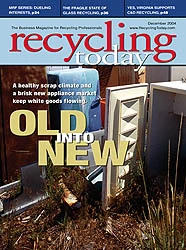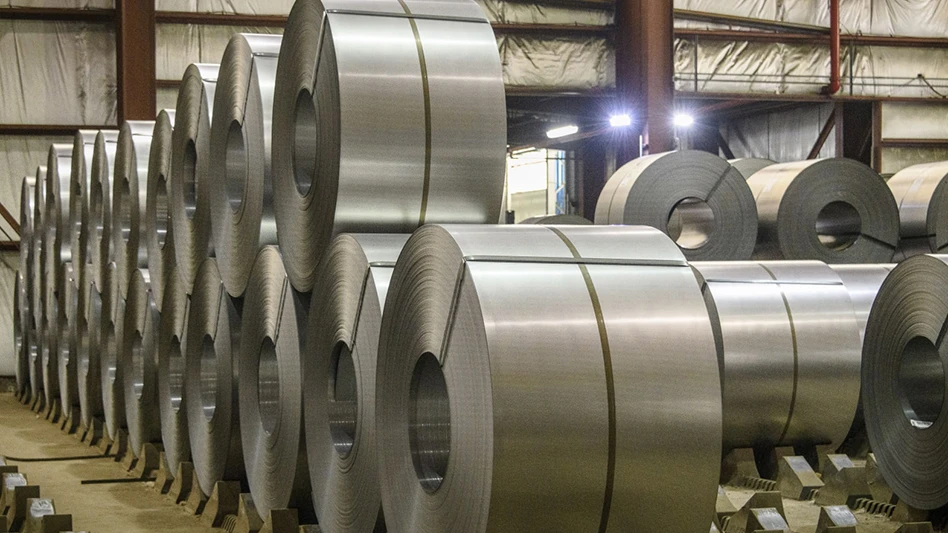T
here is no shortage of variety when it comes to containers for the residential and commercial collection of recyclables.For residential recycling, collection containers range from curbside boxes to roll carts designed for use with semi- or fully automated lift systems, while a variety of container sizes and styles are available to meet the needs of various commercial recycling programs.
While source-separated residential curbside recycling programs generally employ a variety of curbside boxes made of high-density plastic with a capacity of roughly 12.5 gallons to sort recyclables by type, roll carts for use in single-stream programs can range from 16 to 96 gallons.
Likewise, various kinds of trucks are available for transporting recyclable materials from MRFs or scrap yards to processors and consumers. Roll-off containers, tractor/trailers and flatbed trucks equipped with containment systems for the transport of auto hulks are among the most widely used.
Containers and trucks often represent a considerable investment for municipalities and recyclers; therefore, keeping them in good condition with regular maintenance can help to increase their longevity and to defer future purchases. Spending some time analyzing the needs of a recycling program or business can ensure that these items will serve a company or program efficiently in the years ahead.
CURBSIDE.
Fremont, Calif., offers curbside recycling service to its 47,500 single-family residents through the "Three & Easy Program." The program employs commingled collection of glass, metal, plastics #1 through #7 and paper. Residents receive a 64-gallon roll cart for their recyclables, though Cynthia Virostko, environmental specialist with the city’s Environmental Services Division, says residents can request an extra recycling cart if needed. A smaller 32-gallon roll cart is also available to residents with space constraints.Fremont’s curbside recycling program also includes organic materials, such as food scraps and select food-soiled papers, Virostko says. These items are collected in an organics cart with either a 64-gallon or 94-gallon capacity. "Each resident is provided small pails for convenient collection of organic material in the kitchen," she adds.
The city contracts with BFI for its garbage and recycling services. BFI’s drivers use split-body (one side for recyclables and one for organics), automated side loaders in the Three & Easy program.
According to the terms of the contract, BFI purchases the collection carts used in the Three & Easy program, Virostko says. The company is also responsible for cart repairs, which can include replacing wheels. With proper maintenance and care, the carts have a life expectancy of roughly 10 years, she says.
Virostko suggests looking for quality, durability and design choices when selecting carts for residential recycling programs and also suggests shopping around for the lowest prices that meet needs of the program. She also offers a few suggestions that may seem less obvious. "How does the cart come delivered from the manufacturer? Do the wheels need to be put on? That will determine how much time is needed for delivery to the curb."
Along similar lines, Virostko says to consider the manufacturers’ or distributors’ delivery options. "Will the company deliver the carts to the residents, or will the buyer need to deliver them?"
Finally, she says to ask what standard verbiage, such as disclaimers and warnings, comes stamped on the cart and whether these messages can be changed to meet the needs of the buyer.
For those in the market for trucks and trailers, durability and serviceability also come into play, as do reliability and value.
YARD WORK.
Mike Moran, vice president of transportation for OmniSource Inc., one of the largest processors and distributors of scrap and secondary metals in North America, says the company operates 205 total power units."We have 40 straight truck roll-offs, 22 straight truck luggers and 143 semi tractors," he says. "On the trailer side, we have 25 flat bed car carriers that are equipped with constraint systems to prevent spillage of loose parts from flattened autos that we haul."
OmniSource also has 123 roll-off trailers in its fleet. "These trailers have between two and seven axles depending on the state that the trailer is operated and the legal gross weight limit in those states," Moran says.
In the last five years, OmniSource has converted much of its fleet from straight trucks to tractor/trailer combinations. "This provides much more versatility within the fleet and allows us to haul more cost efficient payloads than before," Moran says. That is because in most states that OmniSource operates in, tractor/trailer combinations can haul between 80,000 and 168,000 pounds of gross weight, while the straight trucks can haul only 68,000 pounds of gross weight to remain within the legal limit, he says. "However, we do still have to use straight trucks in instances where turning space is a concern."
Moran says that OmniSource weighs lease and purchase options before committing to a deal. "Depending on interest rates, capital requirements, etc., we determine on a year-to-year basis which route we will go."
When leasing, he says OmniSource uses financed leases with a guaranteed buyout amount at the end of the lease, which is usually a five-year term. "We always buy out the leases and operate the trucks for another two to four years after the lease expires."
OmniSource also uses independent contractors for 25 percent to 30 percent of its overall transportation needs. "These carriers typically handle longer freight lanes for us or are dedicated to an account that may be located geographically outside of our normal fleet domicile network," Moran says. "We purposely do not try to do all of our business on OmniSource trucks to make sure that our fleet is 100 percent utilized 52 weeks per year. We want to be able to flex with the level of business activity to make sure that we are using all assets to the fullest extent possible."
Moran says OmniSource typically uses its straight trucks and tractors for six to eight years, depending on the application. "Roll-off trailers, if maintained properly, have been known to last between 10 and 15 years."
For OmniSource, proper maintenance consists of adjusting and replacing breaks, greasing and lubricating the unit, repairing lifts and reaving cylinders and being certain tires and lights are in good condition.
Moran says OmniSource typically has its trailers on a 90-day service cycle. "However, due to the nature of our business, many of them are in our shop sooner than that," he adds. "Any time a piece of equipment goes through our shop for any reason, a quick maintenance check is done on the trailer no matter what the nature of the driver write-up is for that instance," he says.
OmniSource also tracks the activity of its tractors, trailers and containers with its dispatch software, though Moran says this is in part a manual process that requires the drive to write down where each container was delivered on his shipping paperwork. The administrative clerk then has to key the information into the software.
"The software is excellent," he says. "However, due to the human interaction that is required, there is still room for error. We are currently testing a GPS system that, in conjunction with a bar code scanner and the cellular telephones that the drivers carry, [give us] the capability of tracking all equipment on a much more accurate and real-time basis."
While containers and trucking equipment often entail significant expense for recyclers, the need for them is undeniable. With some forethought and a little TLC along the way, this equipment can serve at the curbside or along highways for some time.
The author is associate editor of Recycling Today and can be contacted at dtoto@gie.net.

Explore the December 2004 Issue
Check out more from this issue and find your next story to read.
Latest from Recycling Today
- Fitch Ratings sees reasons for steel optimism in 2025
- P+PB adds new board members
- BlueScope, BHP & Rio Tinto select site for electric smelting furnace pilot plant
- Magnomer joins Canada Plastics Pact
- Out of touch with reality
- Electra names new CFO
- WM of Pennsylvania awarded RNG vehicle funding
- Nucor receives West Virginia funding assist





